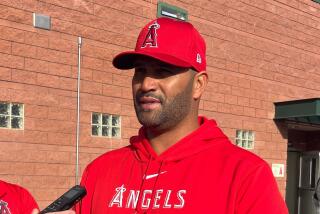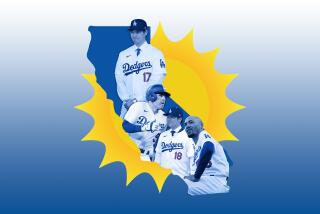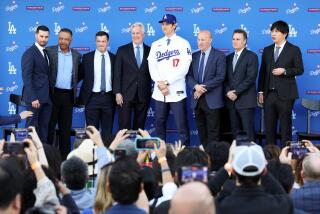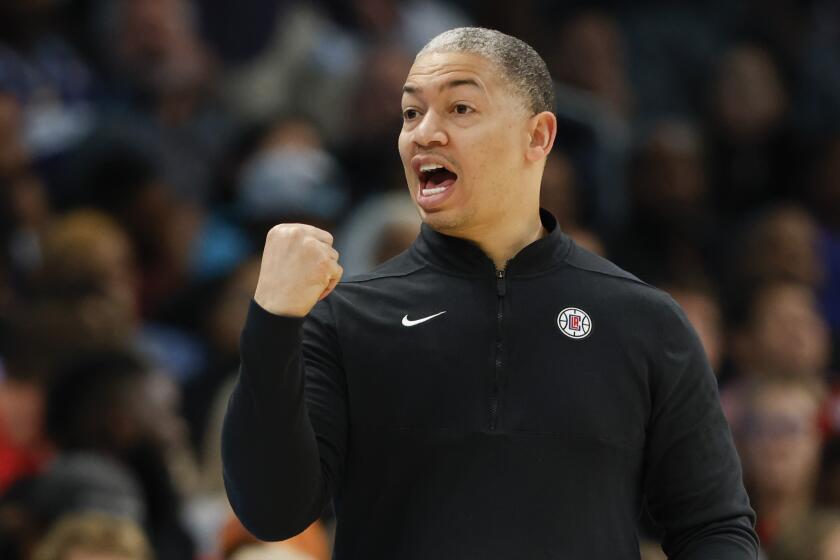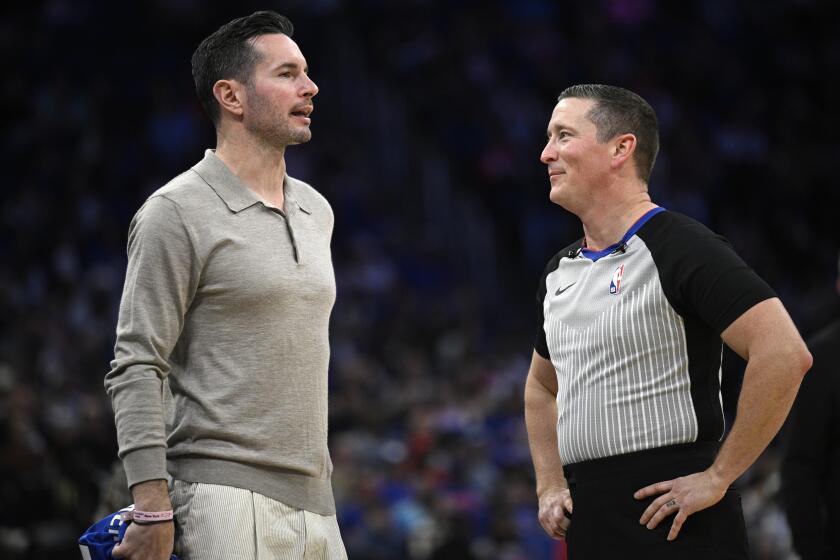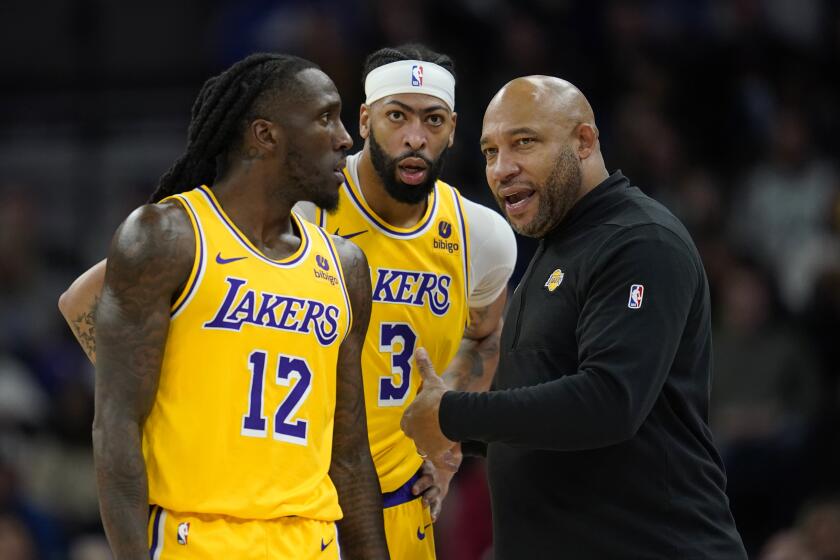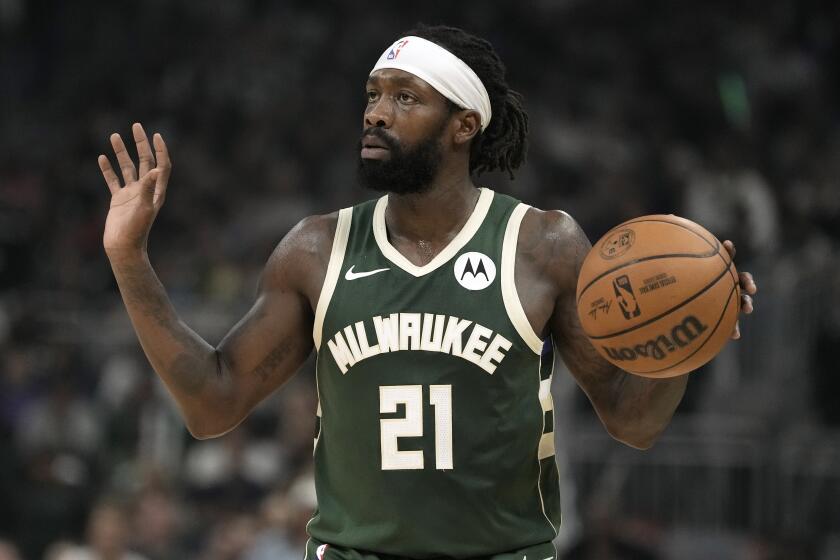Will the Angels get their money’s worth from Albert Pujols?
Albert Pujols can lead the Angels to a few World Series championships, win several most-valuable-player awards, set the all-time home run record and pass 3,000 hits, and he would not pay for himself.
It seems unlikely that any player, no matter how dominant and marketable, can generate close to $240 million in 10 years.
But that’s not to say the Angels aren’t already benefiting from the Dec. 8 acquisition of Pujols, which, combined with the same-day signing of pitcher C.J. Wilson, sparked a surge in ticket and merchandise sales.
There is also the intangible that often makes this high-stakes game of player acquisition worthwhile. If owner Arte Moreno sells the team after Pujols’ retirement, he could recoup a big chunk of his massive investment, which was made possible, in part, by a 17-year television rights extension with Fox Sports that will pay the Angels between $2 billion and $2.5 billion beginning in 2016.
The Angels wouldn’t benefit from increased ratings and ad rates on television — that goes to Fox — but could charge more for ads tied to their radio rights.
Moreno bought the Angels for $183 million in 2003. Forbes Magazine valued the team at $554 million in 2011. A decade-long run of success with Pujols could push the Angels toward $1 billion.
“You have to look at the value of the team itself and how much it increases down the road,” said Ben Sturner, chief executive and founder of the Leverage Agency, a New York-based sports entertainment and marketing firm. “It always goes up when you get a blockbuster superstar, especially in a big market like Los Angeles. They have arguably the best player in baseball. I’m not saying it’s the same as Michael Jordan or Kobe Bryant, but it gives them drawing power.”
In Pujols, the Angels have a potential game-changing asset, a Hall of Fame-caliber player who hit .328 with a .420 on-base percentage, 445 home runs and 1,329 runs batted in for the St. Louis Cardinals from 2001-2011.
In the month since Pujols and Wilson signed, the Angels have sold 3,000 new full season tickets packages — an increase of more than 50%from a similar period in 2011 — plus the equivalent of 2,300 full season tickets in mini-plans.
Because the bulk of those partial season-ticket purchases have been in more expensive seats, they have resulted in a yield 300% better than at this point last year.
And December is “generally a slow time” for ticket sales, according to Robert Alvarado, the team’s vice president of marketing and ticket sales.
“Sales usually peak the first two weeks of March and tail off in early April, so we’re still on the upside of the bell curve,” Alvarado said.
Despite missing the playoffs for the second consecutive season, the Angels averaged 39,000 in paid attendance in 2011, fifth-best in baseball.
If Pujols performs up to expectations and the Angels, who have a superb pitching rotation and potentially deep lineup, challenge the Texas Rangers in the American League West, attendance should increase as excitement builds.
According to Team Marketing Report, a Chicago-based sports marketing research company, the Angels’ average ticket price, including regular and premium seats, is $25.57. That means that if the Angels boost attendance by an average of 4,000 over 81 games, they would generate an estimated $8.3 million more in ticket revenue over 2011.
If attendance increased by 6,000 a game, pushing the Angels toward stadium capacity of 45,389, they would generate an estimated $12.5 million more than in 2011.
Teams that go deep into the postseason also generate millions in additional gate receipts.
“We’re anticipating attendance going north of 40,000,” Alvarado said. “We also expect the show rate, the number of people actually using their tickets, to increase.”
Major League Baseball does not release no-show rates, but people who know the business say a range between 10% and 20% is typical.
If the Angels averaged 43,000 in paid attendance and had a no-show rate of 16%, their actual attendance would be 36,120 a game. But if Pujols and the team play well enough to spike interest and the no-show rate drops to 8%, an average of 3,440 more fans would be in the stadium every game.
With fans spending an average of $17 a game on food, beverages and parking — this is known as “per-cap” spending — the Angels, in this scenario, would generate an additional $4.75 million a season in revenue by cutting their no-show rate in half.
“When attendance spikes, it has an ancillary impact on food and beverage, parking and merchandise sales,” Alvarado said. “Those are big for us.”
Alvarado said merchandise sales in the stadium team store were as brisk in December as they usually are in the postseason, and 60% to 70% of the items sold were Pujols- or Wilson-related.
Fans can purchase an authentic Pujols jersey for $284, a replica jersey for $100 and T-shirts for $20 to $25.
“I bought a few to give as Christmas gifts,” said Angels General Manager Jerry Dipoto, who also purchased the jerseys of Wilson and several other players. “They’re not cheap.”
After the Dodgers acquired Manny Ramirez in 2008, they sold 14,000 Ramirez T-shirts at $29 each, 6,000 dreadlocks at $25 each and 500 authentic jerseys at $280 each, generating $700,000 from stadium sales in only two months.
Alvarado also said interest among prospective sponsors has increased since the Pujols and Wilson signings.
“People are contacting us, or sponsors are actually taking our calls,” he said. “You can’t put a monetary value on that because it’s a long, drawn-out process, but the interest is out there.”
When Hideki Matsui played in Anaheim in 2010, the Angels made an additional $1 million from Japanese companies advertising in the stadium. Pujols could attract more national advertisers.
“We haven’t had a player of this prominence,” Alvarado said, “a guy who could draw this kind of national pull.”
Sponsorship, said Jon Greenberg, executive editor of Team Marketing Report, is “all about basking in reflected glory. A guy like Pujols is someone companies want to be in bed with.”
The Angels historically have taken a team approach to marketing, but Pujols, as the showcase player, will take a more prominent position on billboards and in ads promoting the team.
Sturner said the Angels need to be careful not to “oversaturate the market” with Pujols because “there are other players on the team, and you have to have the right balance.”
Alvarado seems aware of that danger, saying Wilson and fellow pitchers Jered Weaver, Dan Haren and Ervin Santana, along with popular outfielder Torii Hunter, will figure prominently.
Of course, that love-at-first-sight affair between Angels fans and Pujols could sour quickly if his skills erode. Pujols, who turns 32 Monday, experienced a marked decline in production last season.
“If Pujols ages overnight, and the Angels don’t win, I don’t see Pujols having much value, financially anyway,” Greenberg said. “He’ll sell tickets certainly for the next few years, and the Angels will reap many benefits because of it.
“But as the fans get used to his presence, he’ll need to perform to their expectations, and the Angels will need to win consistently.”
twitter.com/MikeDiGiovanna
More to Read
Get our high school sports newsletter
Prep Rally is devoted to the SoCal high school sports experience, bringing you scores, stories and a behind-the-scenes look at what makes prep sports so popular.
You may occasionally receive promotional content from the Los Angeles Times.
